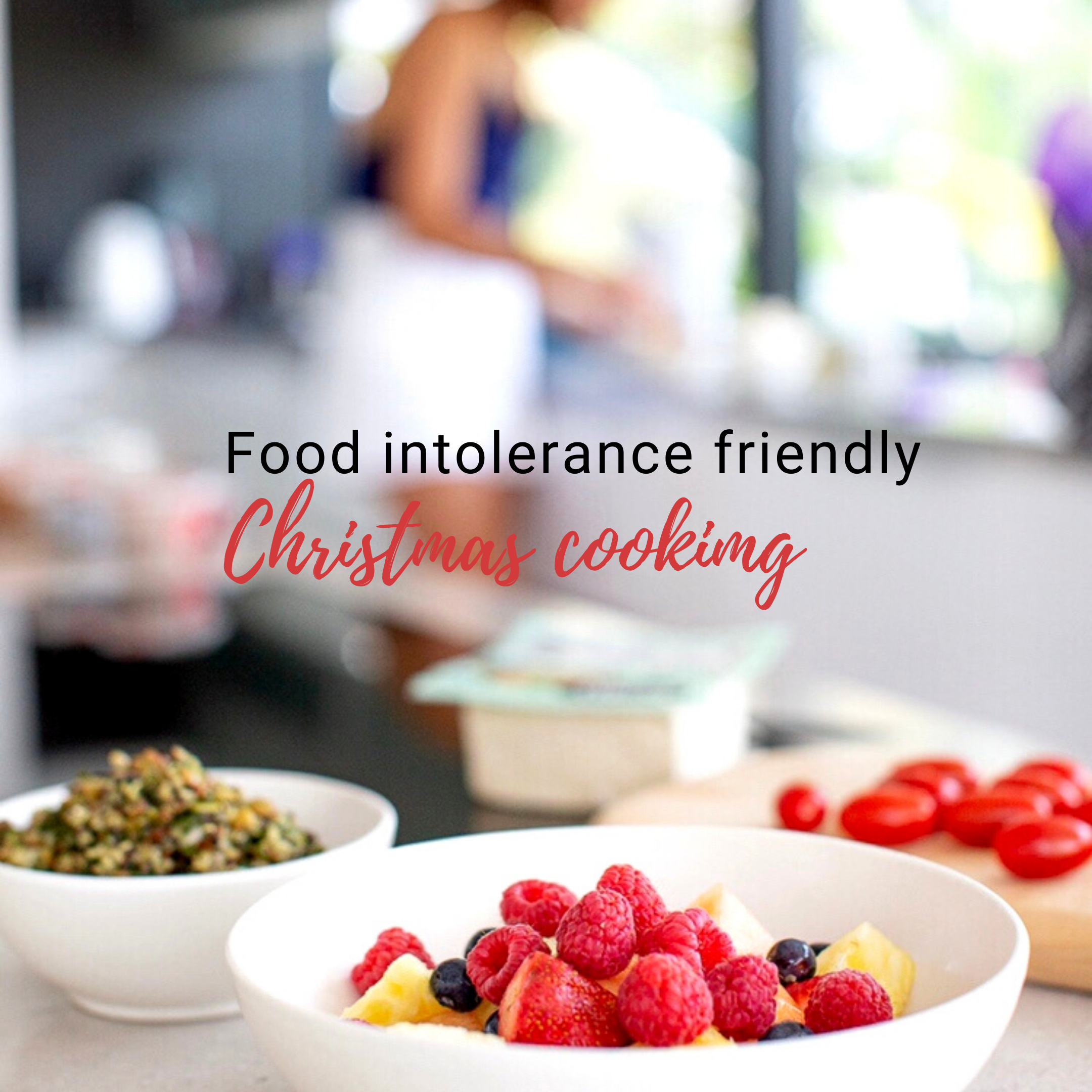If you are hosting a Christmas event, it’s not uncommon to have to cater for various dietary requirements such as veganism through to food intolerances and allergies such as dairy and nuts and medical restrictions such as coeliac disease and IBS.
However, these requirements can easily be catered to, with little fuss, when following below simple replacements and hacks.
Gluten free Options
If any of your guests have coeliac disease, they must avoid all sources of gluten entirely. Other guests may have gluten sensitivity and not feel well when gluten is consumed and choose to avoid it.
Gluten containing grains can often be easily replaced for gluten free options. For example, instead of a cous cous salad, use quinoa. Instead of wheat/regular pasta salad, try gluten free or brown rice pasta. When making a stuffing, use gluten free bread.
Be mindful of hidden sources of gluten such as:
- Soy sauce, malt extract, thickeners, breadcrumbs, sausages, curry powders, batters, yeast extracts, soymilk, malt vinegars, spice mixes, bottled salad dressings,
Simple swaps from gluten containing to gluten free
Gluten containing bread >>> gluten-free bread or chickpea/buckwheat flatbreads
Wheat based baked goods >>> baked goods using almond meal, brown rice flour or buckwheat flour
Gravy >>> tzatziki, peach salsa or chilli jam
Spring rolls / pastry based canapés >>> rice paper rolls or lettuce wraps
Bottled salad dressings >>> home-made salad dressing following this simple formula: extra virgin olive oil, apple cider vinegar and tamari gluten free soy sauce in a ratio of 3:2:1, definitely one of my favourites! Another favourite of mine is tahini, lemon juice, garlic, s&p, and water, mixed until smooth.
Wheat based crackers >>> rice crackers or seed crackers or veggie sticks.
Seasoning and mixes >>> purchase individual packet spice and mix eg cumin, coriander, paprika, oregano for a nice spicy flavour!
Rum balls >>> fruit/nut bliss balls
Nut free
If cooking from scratch, it’s quite easy to avoid nuts. If you are using bottled sauces and ingredients, make sure to carefully check the ingredients list and any claims made.
Nuts tend to be used in salads, stuffing’s or in desserts.
If nuts need to be avoided, they can be replaced with seeds such as sunflower, chia, pumpkin, linseeds or hemp
If seeds don’t suit either, use toasted coconut flakes, pomegranate seeds, julienne carrots or puffed rice/quinoa for crunch.
Dairy free
These days there are so many dairy alternatives so it’s also quite easy to substitute or simply have on the side as optional such as:
Baking >>> use olive oil instead of butter and swap cows milk for soy, rice, oat or almond.
Cheese >>> common in salads over Christmas, instead try baked tofu, avocado or mango.
Yoghurt/ cream >>> use coconut or almond milk yoghurt especially with desserts.
Make sure to check the ingredients list of bottled sauces and dressing because they often contain dairy.
Veganism
A vegan diet means the absence of all animal products entirely.
If you have vegan guests, there are endless vegan ideas, which would sure to please everyone including:
- Stuffed mushrooms – stuff with tofu, nuts/seeds
- Stuffed capsicums – stuff with seasoned rice, herbs and nuts/seeds
- Chargrilled veggie stacks – add some tofu if preferred
- Roast veggie, chickpea and leafy green salads – use a tahini miso salad dressing
- Olives, veggie sticks, marinated veggies (eg eggplant, capsicum), mashed avo, hummus and seed/wholegrain crackers are yummy starters
- Finish the meal with a simple vegan chocolate and fruit platter or try your hands at a raw dessert!
Low FODMAP Diet
In some individuals, certain carbohydrates (FODMAPS) may be poorly absorbed in the small intestine. Consequently, malabsorbed carbohydrates (FODMAPS) are fermented by gut bacteria and produce gas and other irritable bowel related symptoms. Thus, avoidance of FODMAP containing foods may improve the symptoms of IBS in some individuals.
Fermentable – The process through which gut bacteria degrade undigested carbohydrate to produce gases (hydrogen, methane and carbon dioxide)
Oligo-saccharides – Fructo-oligosaccharides (FOS) found in; wheat, rye, onions and garlic
Galacto-oligosaccharides (GOS) found in; legumes/pulses
Disaccharides – Lactose found in; milk, soft cheese, yoghurts
Mono-saccharide – Fructose (in excess of glucose) found in honey, apples, high fructose corn syrups
Polyols – Sugar polyols (eg. sorbitol, mannitol) found in some fruit and vegetables and used as artificial sweeteners, chewing gums
Everyone has varying degrees of FODMAP sensitivity, so it’s impossible to cater exactly for all, but what you can do is offer a relatively low FODMAP meal, by limiting or avoiding the below.
Fruits:
- Avoid/limit: apples, blackberry, cherries, figs, lychee, mango, nectarines, peaches, pear, watermelon, dried fruit except for banana.
Vegetables:
- Avoid/limit: garlic, onion, artichokes, asparagus, beetroot, cabbage, cauliflower, corn, leek, mushrooms, peas, sweet potato, snow peas, sugar snap peas.
Dairy/non-dairy:
- Avoid/limit: butter milk, cream cheese, cream, sour cream, custard, ice-cream, non-lactose milk, non-lactose yoghurt and soy milk.
Grains/cereal:
- Avoid/limit: rye bread, gluten-containing bread, wheat containing cereals, spelt flour, pearl barley, wheat bran, burghal, cous cous, freekeh, wheat noodles, gnocchi from wheat, spelt pasta.
Nuts/legumes:
- Avoid/limit: cashews, pistachios, butter beans, black beans, chickpeas, soybeans, falafel.
Meat/protein – majority fine except sausages and processed meats.
Sweets:
- Avoid/limit: milk chocolate, honey, agave syrup, golden syrup.
